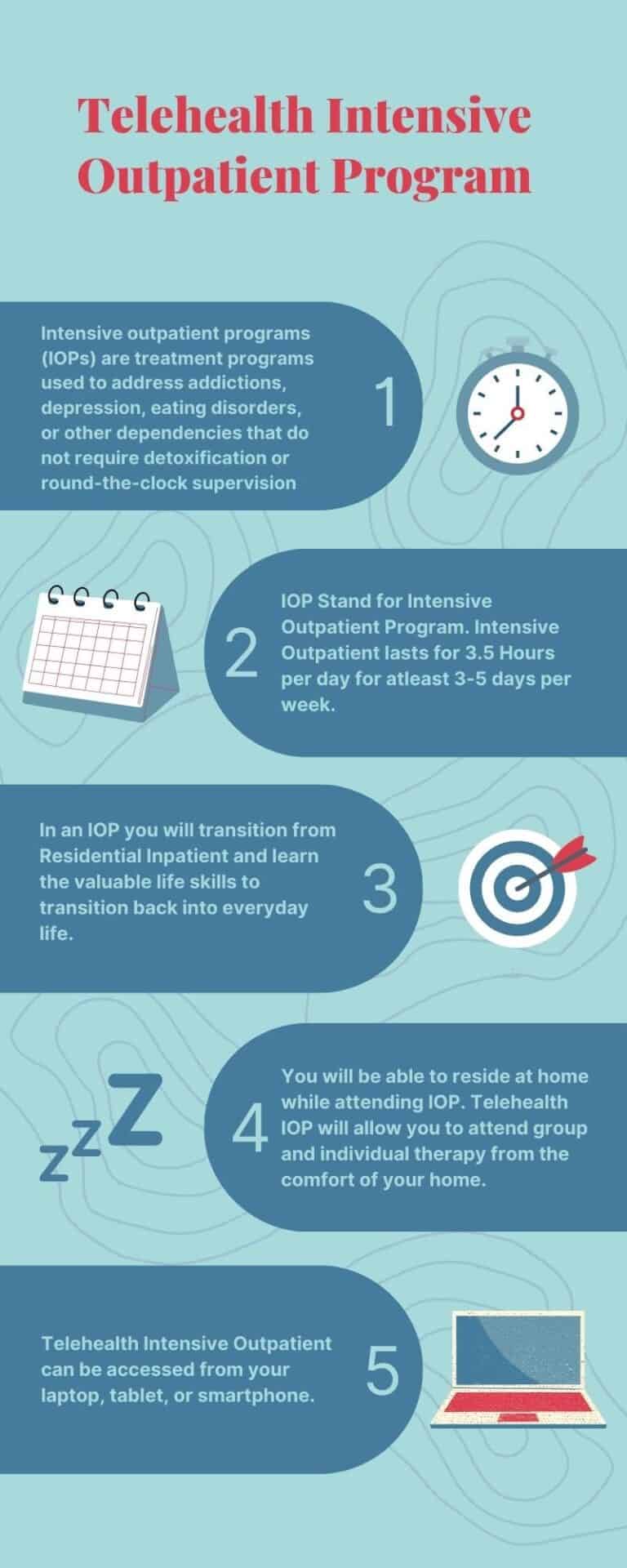Discovering the Function of Nutrition and Workout in Enhancing the Efficiency of an Intensive Outpatient Program
In the realm of intensive outpatient programs (IOPs), the crossway of nourishment and workout frequently stands as an encouraging yet underexplored opportunity for improving restorative results. As we browse the landscape of mental health and wellness and dependency treatment, the importance of all natural methods can not be downplayed. The potential harmonies in between tailored nourishment plans, physical activity routines, and traditional IOP treatments offer an engaging recommendation. By identifying the innate link between body and mind, we may reveal a riches of opportunities to enhance the effectiveness of these programs.

Advantages of Nutrition in IOP
In Extensive Outpatient Programs (IOP), including a well-balanced nourishment strategy plays a vital duty in sustaining individuals' overall health and wellness and recovery trip. Proper nourishment is basic in promoting physical and mental health throughout the therapy process. By concentrating on nutrient-dense foods, people in IOP can improve their power levels, concentration, and state of mind security, which are vital for effective therapy participation and general recovery progress.
Nourishment plays a significant function in supporting blood sugar degrees, which can assist minimize cravings and keep psychological balance. Generally, the advantages of prioritizing nutrition in IOP are clear: enhanced physical wellness, enhanced psychological well-being, and increased strength in the face of challenges throughout the healing journey.
Effect of Workout on Therapy
With a structure of prioritizing nourishment developed within intensive outpatient programs, the consolidation of exercise further boosts the detailed method to supporting people' total health and wellness and recovery journey. Physical task plays a critical duty in mental wellness therapy by promoting overall wellness and aiding in the management of various psychological wellness problems. Intensive Outpatient Program (IOP). When exercise is integrated right into extensive outpatient programs (IOPs), it complements the benefits of nutritional treatments, leading to better therapy end results
Routine workout has been shown to minimize symptoms of stress and anxiety, depression, and stress and anxiety, which are usual problems for individuals in extensive outpatient therapy. Participating in physical activity launches endorphins, natural chemicals that help minimize pain and generate sensations of pleasure, subsequently enhancing mood and reducing adverse emotions. Workout can improve cognitive function, enhance rest high quality, and rise self-esteem, all of which are crucial components in the healing procedure.

Integrating Healthy Eating Routines

A balanced diet plan rich in nutrients like fruits, veggies, whole grains, lean healthy proteins, and healthy and balanced fats can offer the essential fuel required for the body to recover and recover. Moreover, proper nourishment can help stabilize mood, boost cognitive feature, and boost general power degrees, which are vital for people proactively getting involved in treatment and other treatment modalities.
Including nutrition education, meal planning, and keeping track of into extensive outpatient programs can empower people to make much healthier food choices, create lasting eating behaviors, and eventually support their long-term healing objectives. By addressing the value of healthy eating practices within the context of intensive outpatient programs, doctor can provide a more holistic approach to treatment that deals with both physical and mental wellness.
Exercise Approaches in IOP
Exactly how can exercise be effectively integrated right into extensive outpatient programs to improve total wellness and treatment outcomes? Physical activity methods in Intensive Outpatient Programs (IOP) play an important duty in advertising holistic wellness and boosting mental health and wellness end results - Intensive Outpatient Program (IOP). Incorporating organized exercise routines customized to specific requirements can dramatically improve the efficiency of IOPs
One reliable technique is to use a variety of physical activities to provide to various preferences and physical fitness levels. Furthermore, integrating physical activity breaks throughout the program schedule can Visit This Link assist damage up sedentary durations, boost energy levels, and boost emphasis throughout therapy visit this site sessions.
Moreover, entailing qualified health and fitness teachers or physical therapists in the program can make sure that exercises are secure, efficient, and lined up with individuals' therapy goals. Normal tracking of individuals' physical task levels and progress is necessary to track enhancements and make changes as required. Overall, incorporating customized exercise strategies in IOPs can contribute to much better treatment end results and overall health for people seeking intensive psychological health and wellness assistance.
Holistic Strategy for Better Results
Applying a thorough strategy that attends to all facets of a person's wellness is essential for making the most of therapy outcomes in extensive outpatient programs. An all natural technique thinks about the interconnectedness of physical, mental, and psychological health, acknowledging that these elements are integral to general well-being. By incorporating alternative practices right into extensive outpatient programs, individuals can experience much more extensive and long lasting advantages.
Integrating nourishment and workout treatments alongside psychological wellness therapies can lead to enhanced treatment end results. Nourishment plays an essential function in sustaining psychological health and overall health, providing necessary nutrients for cognitive function and emotional regulation. Routine physical task has been revealed to boost mood, minimize stress and anxiety, and boost cognitive feature, all of which are helpful for individuals undertaking extensive outpatient treatment.
Conclusion
Finally, the integration of nourishment and workout into an intensive outpatient program can significantly improve its performance. By focusing on healthy and balanced eating behaviors and physical task techniques, individuals undertaking treatment can experience enhanced outcomes. Taking a holistic approach that resolves both physical and mental well-being is necessary for promoting general health and healing in IOP setups.